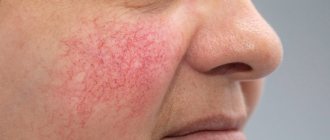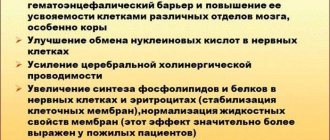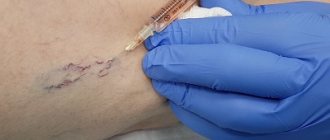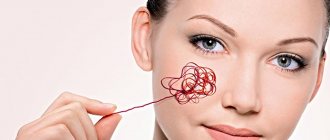What causes noise, humming and whistling in the ears, what to do with them if they poison your life, and in general - is it dangerous? How to determine the cause and is it possible to get rid of unpleasant hearing sensations forever?
I don't want to hear it!
We have already written about tinnitus - noise, hum and/or whistling in the ears, as a sensation of unknown etiology, without an external sound source (see the articles “...Do you hear it too?” and “I hear a ringing, but I don’t know where it is” ). In short: perhaps each of us has encountered such phenomena at least once in our lives. For most people, the ringing goes away quickly, leaving no unpleasant consequences or memories. But sometimes an annoying symptom occurs so often and lasts so long that it forces you to see a doctor. And it is right! To begin with, you can make an appointment with a local therapist, an ENT specialist, or better yet, directly with an audiologist at a specialized medical center.
Detailed examinations (including MRI, CT, ECG, blood tests, etc.) will help identify the true cause. It is not always subjective, that is, true tinnitus. There is a high probability of detecting very real diseases.
Vascular problems
Most often they arise due to compression in the cervical spine - let’s say “thank you” to the lack of mobility, long hours of working at the computer, relaxing with a smartphone in hand. But there may be other reasons: cerebrovascular accidents, rapid pulse, high or low blood pressure. And this, in turn, is also a symptom. It’s just that there are no big deviations from the standard 120/80 and 110/70.
Treatment then will consist of removing blocks and clamps in the neck from a neurologist, orthopedist, chiropractor, normalizing blood pressure, etc.
By the way, one of the signs (not mandatory, do not engage in self-diagnosis, doctors warn, just take note and pay attention to the specialist at the appointment) that noise, humming and whistling in the ears are associated with blood vessels, if they have a pulsating nature, which coincides with the heart rate abbreviations.
But there can also be very dangerous conditions! For example, tinnitus is one of the first, early signs of a stroke. If you have time to consult a doctor, the destructive effect on the body can be prevented or smoothed out.
Fainting
VSD with syncope (fainting) also refers to paroxysmal manifestations. This is a neurogenic type of VSD, the main role in the development of which is played by a sharp decrease in blood pressure. Short-term loss of consciousness is more often observed in young people with increased emotional lability. Fainting occurs under the influence of a specific factor (uncomfortable environment, change in ambient temperature, etc.). An attack is usually caused by the same factor, which is individual for each patient.
Often before an attack, the patient’s ears become blocked due to VSD. Presyncope with VSD can also be accompanied by suffocation, rapid heartbeat, and dizziness. Fainting is a particularly dangerous condition because a fall can cause serious injury. Therefore, VSD with this type of attack requires careful monitoring.
Development of otitis media
Adults rarely turn to an ENT specialist for otitis, they prefer to warm the ear, drop drops, after reading advice from the Internet, but this may not eliminate the disease, but drive it into a chronic form, only by relieving acute attacks. Otitis is considered a childish, even infantile problem, and not many people think about it when they hear tinnitus. But as soon as old inflammations are treated (by the way, tympanometry, a fast and affordable modern diagnostic method, can help detect them), hearing perception is restored.
Causes
The reasons that lead to this phenomenon can be different - from infections and inflammations to allergic reactions. It can also be caused by a foreign body getting into the ear. Anemia, high blood pressure, and other illnesses (including something as serious as Meniere's disease, a swelling of the inside of the ear canal) can cause a person to experience a humming, buzzing, or squeaking sound. Also, similar sensations can be caused by the use of alcohol and drugs, large doses of caffeine and certain medications. Sometimes tinnitus can occur after stress or loud noise. Excessive earwax can also cause tinnitus.
Nervous system diseases
There are a lot of them! This includes multiple sclerosis, meningitis, epilepsy, and a consequence of age-related changes (such as Parkinson's disease)... Dozens of diagnoses, many of which are very serious, but they still need to be made. Noise, humming and whistling in the ears are therefore important symptoms. If they bother you or your loved ones, and the therapist or other specialist to whom you turned for help “waves it off”, saying that it’s tinnitus, a sound for no reason... perhaps you should first look for a more meticulous doctor. There is always time to decide that the sounds come from nowhere and are harmless.
By the way, frequent stress and overwork lead to problems with the nervous system. Maybe before you get an appointment, you should try to at least get some rest? Take a time out, be quiet and in nature. If the intrusive sounds disappear at this time, you are on the right track. Stress less and rest more. You can ask your doctor to prescribe sedatives, but this is not necessary.
Causes of symptoms in patients with vegetative-vascular dystonia
Vegetative-vascular dystonia is a pathology that is characterized by a violation of the innervation of the tone of arteries and veins in response to changes in the parameters of the internal or external environment.
The onset of VSD is most often observed in adolescents during the phase of active growth and hormonal imbalance. The additional influence of high concentrations of estrogen or testosterone disrupts the lability of the tone of the smooth muscle structures of the arteries.
Tinnitus with VSD is vascular in nature - increased blood flow in the internal carotid artery, which passes through the tympanic cavity, causes the appearance of symptoms.
Characteristics of ringing or stuffy ears with VSD:
- one- or two-sided;
- not constant intensity;
- rhythmic pulsation in time with the contraction of the heart;
- "hissing character"
Experts associate the frequency of complaints with the tendency of patients in this category to “self-listen” to the somatic sounds of their own body. Lability of vascular tone is often accompanied by an increase in blood pressure, which causes a feeling of heaviness or pain in the back of the head.
Constant exposure to stress factors (emotional), overheating or hypothermia contribute to the development of frequent episodes of exacerbation of symptoms.
Incorrect fitting of hearing aids
As a rule, in this case, a person is bothered not so much by noise or hum, but by whistling in the ears. Fortunately, the problem can be solved with proper configuration. And in the Signia line, for example, there are hearing aids with a tinnitus masking function.
Did you know that if a hearing-impaired person has been bothered by extraneous and causeless sounds for a long time, then often it is after setting up the devices that the unpleasant sensations either soften or go away completely. Isn't that right for you? Tell your audiologist about this.
Read also
Kinetosis/motion sickness-motion sickness
Occurs when driving in a vehicle, ship or carousel.
It begins with malaise, fatigue, yawning and pale skin, then mild dizziness occurs, followed by cold… Read more
Videonystagmography
Videonystagmography (VNG) is the latest non-invasive method for qualitative and quantitative assessment of vestibular disorders. This method is used to study ocular nystagmus. Any true...
More details
Benign positional paroxysmal vertigo
How great it is when you feel dizzy with happiness, but unfortunately there are people who are afraid of this symptom because this symptom greatly interferes with their quality of life. Dizziness is not a diagnosis, it is a symptom...
More details
Meniere's disease
Meniere's disease is a disease in which the leading symptoms are systemic dizziness, accompanied by hearing loss, a feeling of fullness and tinnitus. Paroxysmal dizziness,…
More details
Fainting
Attacks of dizziness and fainting are pathological conditions that occur when the body overreacts to certain triggers, such as extreme emotional...
More details
Benign or malignant tumors
They can be localized in the ear canal, different parts of the inner ear, affect the brain... They are detected on CT and MRI. Correcting the problem may require surgical removal and serious treatment afterwards.
***
All this is not a complete list of possible causes of noise, humming and whistling in the ears. This is why diagnostics are needed to determine the true one. But you have to be prepared and understand that this doesn’t always work out right away.
And sometimes the cause of tinnitus cannot be found; whistling, ringing and humming can simply be heard by a person, but have no further effect on health. This also happens. However, there is no need to despair. Correction of true tinnitus is multifaceted: from working with a psychologist and taking sedatives to specially designed auditory perception training, when as a result a person stops noticing whistling and other unpleasant sounds in the ears.
Causes of tinnitus
Tinnitus can be caused by a wide range of causes, including some serious medical conditions. First of all, tinnitus is caused by pathologies of the hearing aid. They can be classified by area of localization.
Pathologies of the inner ear:
- presbycusis – atrophic and dystrophic changes in the inner ear of an age-related nature. In this case, tinnitus usually accompanies the development of hearing loss;
- noise damage to the inner ear. The reason may be, for example, listening to loud music on headphones for a long time;
- long-term use of certain medications that are characterized by ototoxicity (adverse effects on the hearing organs);
- otosclerosis (pathological growth of bone tissue of the inner ear). With otosclerosis, noise and hearing loss are observed first in one ear, and a few months later the pathology may develop in the second ear;
- Meniere's disease (fluid accumulation in the inner ear cavity). The main symptom of the disease is dizziness;
- labyrinthitis (inflammation of the inner ear). It also manifests itself primarily as dizziness. Tinnitus is a minor symptom.
Middle ear pathologies:
- Otitis media (inflammation of the middle ear). The main symptoms are ear pain, fever, and possible purulent discharge from the ear. Ear congestion and noise are caused by the presence of fluid (such as pus) in the tympanic cavity;
- exudative otitis (accumulation of fluid in the middle ear cavity). This type of otitis media is worth highlighting separately, since, as a rule, there are no other symptoms with it, except for hearing loss and tinnitus;
- damage to the eardrum (for example, as a result of sound trauma).
Pathologies of the external ear:
- sulfur plug;
- an insect or foreign body entering the ear canal.
Other possible causes of tinnitus
Tinnitus can also be caused by:
- pathologies of the cardiovascular system
. In particular, with atherosclerosis, plaques on the walls of the arteries lead to disruption of blood flow, and turbulence (turbulence) occurs. This uneven movement of blood causes vibration, which is perceived by the hearing aid and is felt as tinnitus. The sensation of tinnitus intensifies with an increase in blood pressure, which can be persistent (hypertension), or can be caused by situational factors such as stress, alcohol or caffeine consumption;
- pathologies of the nervous system
. Noise in one ear, accompanied by hearing loss, dizziness and a sensation of “goosebumps” crawling across the face, is observed with a neuroma (tumor of the auditory nerve). Tinnitus can also be a symptom of multiple sclerosis or migraine.
Why do vessels feel the wind?
And how are rain and the heart connected? Many situations are explained by elementary physics and simple physiology. Thus, when atmospheric pressure drops, the pressure in the vessels decreases and the speed of blood flow decreases. Gases form in the intestines. They expand the abdominal cavity and accordingly raise the diaphragm, the result is that it is difficult to breathe, the heart and blood vessels experience a lack of oxygen. If the atmospheric pressure rises, then the pressure in the vessels increases accordingly and the speed of blood flow increases, which also causes discomfort.
When there is a strong wind, it is more difficult for us to breathe - and the oxygen content in the blood naturally drops. Also, degrees outside the window and changes in atmospheric pressure affect the activity of some enzymes. Scientists say that in anticipation of an upcoming downpour, hail, hurricane, pressure surges or sudden warming or cold weather, a person’s defense system is triggered: hormonal levels, enzyme activity, platelet content and blood clotting indicators change.
But in principle, one cannot talk about the influence of one weather factor. As a rule, they act together on our well-being. And you can derive such formulas. Cold wind plus high atmospheric pressure equals excess oxygen and vasospasm. Low atmospheric pressure plus high humidity, high (or low) temperature equals a lack of oxygen and heaviness in the head.
Manifestations of weather dependence include fluctuating blood pressure, rapid pulse, shortness of breath, fever, sleep problems, dizziness, headaches, joint pain, cramps, weakness, fatigue, apathy, drowsiness, chills, bad mood, absent-mindedness, and memory problems.
The most critical situations for a weather-dependent person are a sharp drop or rise in atmospheric pressure, a temperature difference outside the window of 8 degrees or more for 48 hours. But in fact, there are no more than two dozen truly difficult days for well-being a year. Once every five to six days a person may react to the weather with a slight deterioration in health.










